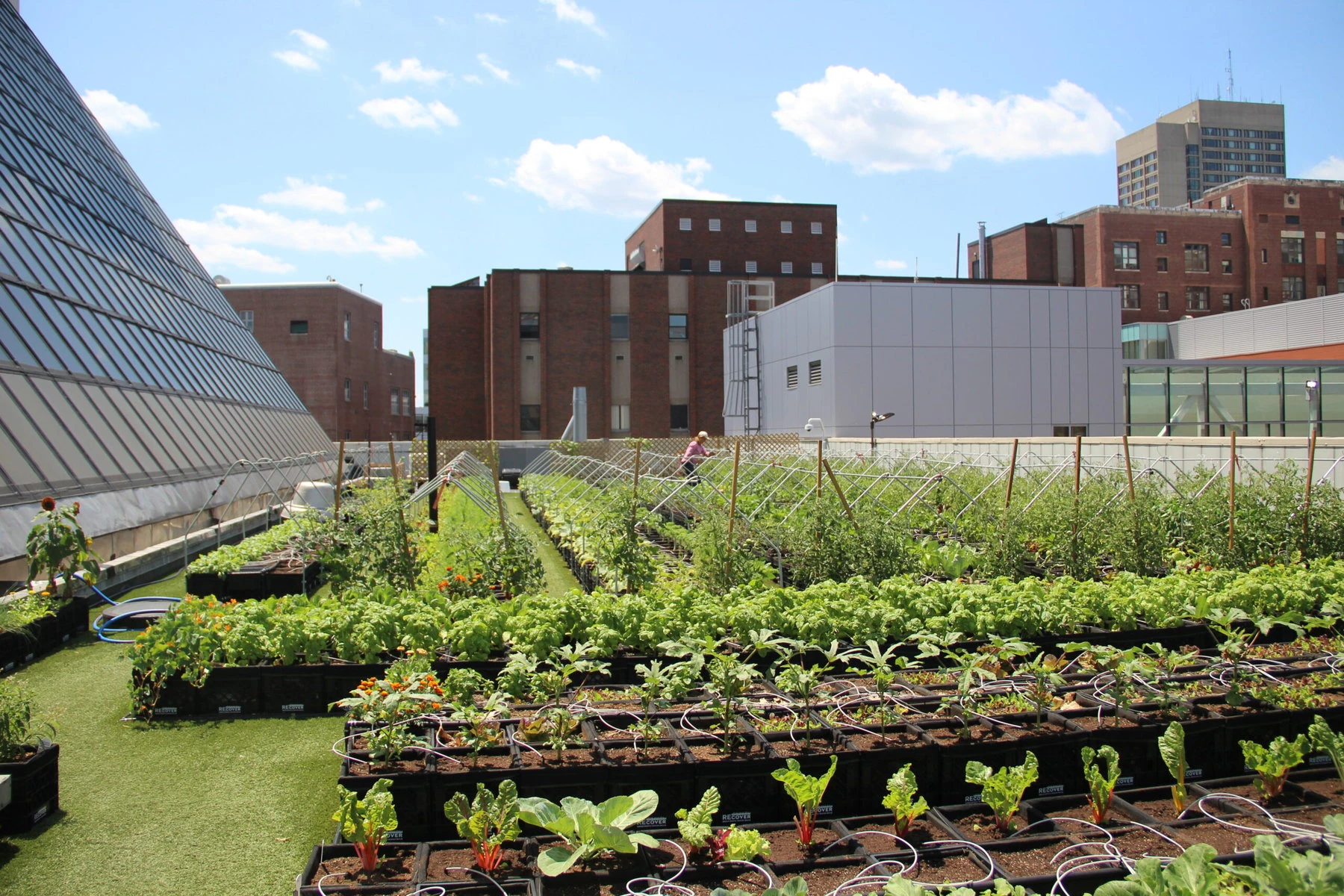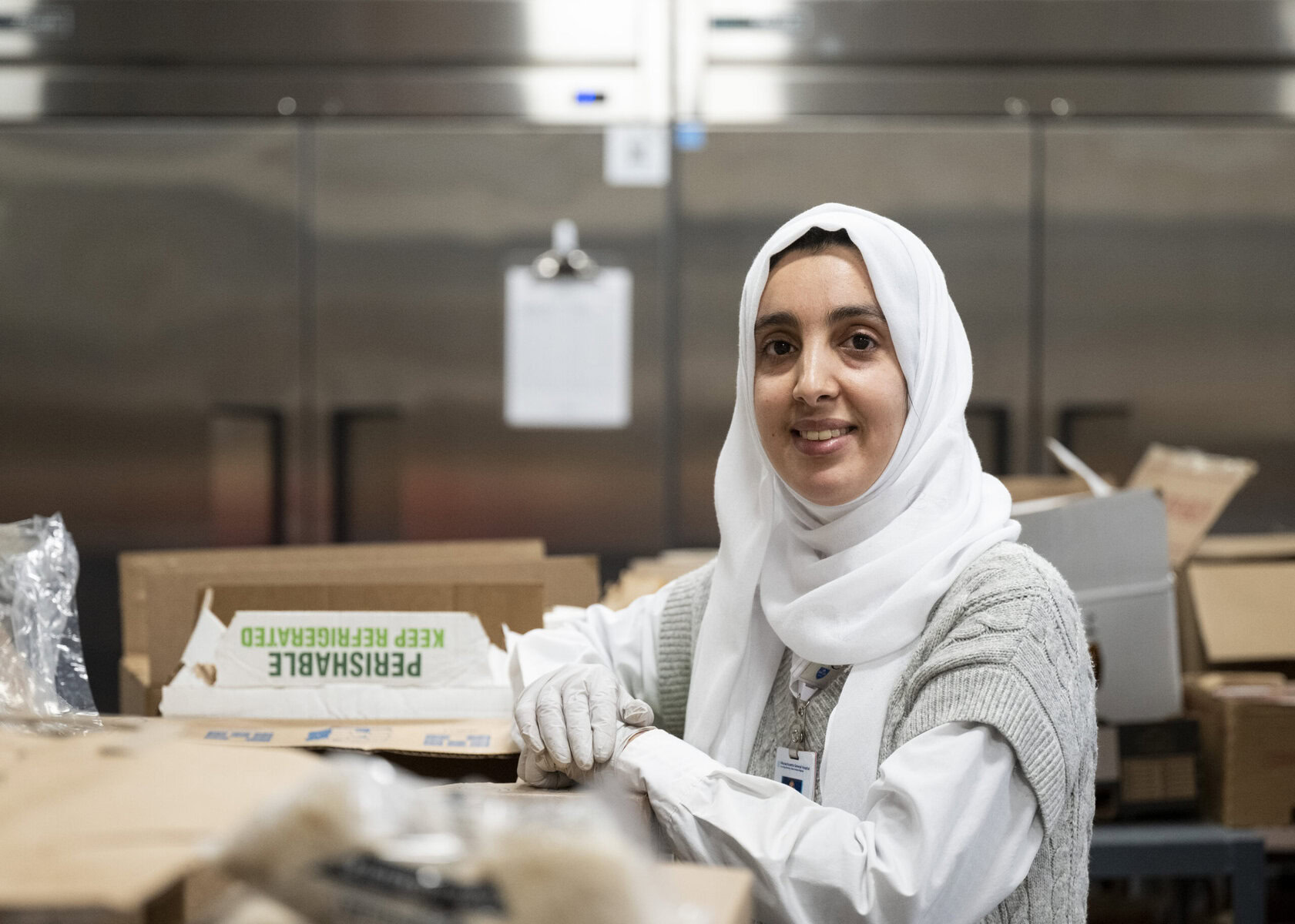The waiting room in the basement of Boston Medical Center looks like any other, with lines of chairs and a TV. But when patients here are called in, they don’t enter an exam room. Instead, they’re welcomed into the Preventive Food Pantry.
Over the next few minutes, staff members tailor a grocery cart to each patient’s needs. Someone with a renal condition won’t get foods high in potassium, like oranges or potatoes. If they’re diabetic, they’ll get whole-grain pasta and brown rice. And everyone leaves with vegetables, fruit and other fresh ingredients.
There’s a grain of truth to the old adage that “an apple a day keeps the doctor away”: Recognizing that nutritious food is a cornerstone of good health, the doctors at Boston Medical Center are prescribing the apples.
“Food is a basic item that people take for granted,” says pantry manager Latchman Hiralall. “We need to make sure that people are eating the right type of food.”
The pantry opened in 2001 after doctors raised the alarm that many of their patients reported not having enough food for their families. Setting up on hospital premises, the pantry was an early pioneer in incorporating access to nutritious food directly into the medical system. And it’s proven to have great impact: The pantry was initially expected to serve 500 people a month. Today, it serves more than 6,200.
This medical center’s approach is part of a growing movement of collaboration between health providers and anti-hunger programs. With options ranging from medically tailored meal deliveries to produce prescriptions to pantries working out of health facilities, experts say these connections are having positive health impacts, improving access to high-quality foods and reducing stigma.
“It’s part of the normal care, like ‘I went to the pharmacy, I’m also going to go to the therapeutic pantry,’ or ‘I was able to get signed up for home-delivered meals that address my chronic disease,’” says Catherine D’Amato, president and CEO of the Greater Boston Food Bank, which works with the Preventive Food Pantry and other Massachusetts health institutions. “That’s where you get alignment of care.”
From early childhood through adulthood, food insecurity has health repercussions. Hunger is linked to impaired brain development, asthma, and conditions like diabetes and heart disease. Researchers estimated that the health care costs associated with hunger were more than $160 billion nationwide in 2014. In Massachusetts alone, that figure was $1.9 billion.
Addressing hunger isn’t just a question of quantity of food, but also quality. Healthy produce, fresh meat and dairy products tend to be more expensive, so for families trying to stretch their dollar, those foods are harder to afford.
Yet those are cornerstones of healthy diets. And while both health care and anti-hunger organizations have long understood the importance of nutrition to health, there wasn’t much collaboration.
Crushed by negative news?
Sign up for the Reasons to be Cheerful newsletter.
“While we manage people’s illnesses,” says D’Amato, “companies have not necessarily been focused on preventing the illness.”
Over the last few decades, that has started to change. Faced with high costs of treating conditions linked to food insecurity, medical systems, health insurers and government programs have become more interested in ways to support nutrition access.
And Boston Medical Center was among the first.
For patients who visit the Preventive Food Pantry, their introduction comes via their health care provider. Boston Medical Center screens all patients for social determinants of health, including food insecurity, explains Hiralall. And anyone who is not getting enough to eat is eligible.
While a therapeutic diet isn’t a requirement for patients to access the pantry, it is common. Patients’ referrals note their health conditions so Hiralall, a registered dietetic technician, and pantry staff members can make sure clients get foods that meet their needs.
“If someone is diabetic or hypertensive or has kidney failure, we need to know that,” says Hiralall.

Patients can visit twice a month, leaving each time with enough food to feed their household for three or four days.
One of the program’s hallmarks is its emphasis on fresh ingredients. Half the items the pantry brings in are perishable, notes Hiralall, a contrast to many food shelves that are limited by lack of refrigeration space. Some of the produce is as local as it gets, grown at a farm on the hospital’s roof. Of the 5,000 to 6,000 pounds of vegetables harvested there every year, 70 percent are distributed through the pantry.
The program also collaborates with the hospital’s teaching kitchen, where dietician chefs lead classes on how to prepare healthy meals. Recently, the kitchen hosted Hispanic and Haitian families who taught recipes to hospital dieticians. The pantry helped supply ingredients for those classes, says Hiralall. “We’re learning at the same time,” he notes, “because different cultures have different ways of cooking and different types of food that they eat.”
The fear of being judged for going to a food pantry can be a major barrier to accessing healthy food, Hiralall points out. But integrating the service with a medical system breaks down a lot of that stigma.
“They know that this is part of their care,” he says. “Their doctor gave them a referral to come into the food pantry.”
Since the Boston Medical Center opened its pantry more than two decades ago, the idea has caught on. Hiralall has advised nearly 100 other hospital systems, including others in the Boston area.
The Greater Boston Food Bank, which provides the bulk of the Preventive Food Pantry’s stock, has been expanding its work with other health institutions. The Revere HealthCare Center of Massachusetts General Hospital opened a pantry specializing in plant-based foods in 2020. The organization Community Servings, founded in 1990, delivers meals tailored to the dietary needs of people with cancer, HIV/AIDS, diabetes and other chronic illnesses. Mobile pantries set up at health clinics around Eastern Massachusetts. The food bank has been consulting on a proposed new cancer hospital in Boston to incorporate a pantry on the first floor.

Dr. Lauren Fiechtner, a pediatric gastroenterologist at Mass General, often works with young children who are underweight. She routinely asks her patients’ families if they have enough to eat, and helps connect them to nutrition access programs and their local food shelves. Now, she can refer them to the plant-based pantry located in the Revere medical center.
Fiechtner, who is also senior health and research advisor for the Greater Boston Food Bank, has sought to strengthen connections between the exam room and healthy food throughout her career. As a medical student, she did her residency at Boston Medical Center, where she volunteered with the Preventive Food Pantry.
“It feels good as a doctor that you’re able to provide food,” says Fiechtner. “It’s right there, and they can pick it up while they’re there to see you anyways.”
The connection with a health system has an impact. A GBFB survey found that among people who were screened for food insecurity in a medical setting, 87 percent followed up on recommended resources.

“The endorsement of the physician is always helpful,” says Fiechtner. “If you have a trusted provider that you’ve had a really good relationship with and they’re recommending something, families tend to want to do that more.”
Often patients’ use of these services is tracked in their medical charts, which Fiechtner sees as useful for providers. It’s not helpful to tell a food-insecure family to buy healthier, more expensive foods. But if they’re using a food access program, doctors and patients can work together toward health goals.
And patients are seeing benefits. During the Covid-19 pandemic, food insecurity and childhood obesity rates increased nationwide. But among children in households that received food from Mass General’s plant-based pantry, obesity rates declined. The percentage of kids whose BMI (body mass index) was in the 85th percentile or above dropped from 57 percent in January 2021 to 49 percent by February 2022.
Boston Medical Center doesn’t track health outcomes of patients who visit the Preventive Food Pantry. Because the program provides each household with about a week’s worth of food per month, Hiralall notes, changes in health won’t necessarily correspond to pantry services. But the program does survey clients to get a sense of their experiences, and 90 percent report satisfaction, according to Hiralall. One comment stays with him as a measure of the impact: “This is like my second home.”
Resources are a challenge. While Boston Medical Center has expanded the pantry’s space, many hospitals have limited space and funds for similar programs, according to Hiralall. Collaborations require commitment of staff time and resources. And the cost of food is a challenge — prices rose by five percent from 2022 to 2023.
D’Amato, who has worked in anti-hunger movements for decades, sees how attitudes have shifted. Understanding within health systems is rising around how food can help people manage chronic medical conditions. And addressing hunger can be even more foundational.
“If we think of food as medicine, we’re treating a problem,” says D’Amato. “Earlier on, the chronic disease isn’t there, and food can help prevent those chronic diseases.”
The post The Hospitals That Send Patients Home With Nutritious Food appeared first on Reasons to be Cheerful.




